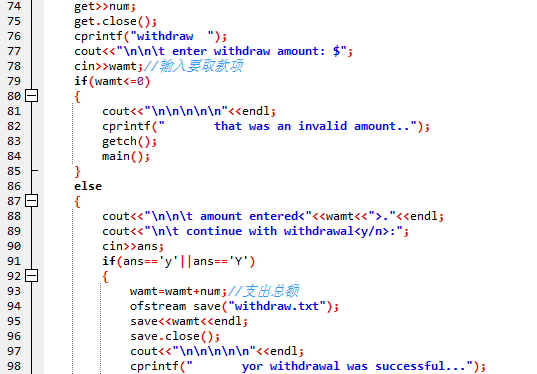Insert at the top of your files #include ' conio2.h' The file should be in your project directory or project search path (include) Maybe you only missed a '.'
conio.h is a C (programming language)|C header file used in old MS-DOS compilers to create text user interfaces. It is not described in The C Programming Language (book)|The C Programming Language book, and it is not part of the C standard library, ISO C nor is it required by POSIX.
This header declares several useful library functions for performing 'console input and output' from a program. Most C compilers that target DOS, Windows 3.x, Phar Lap (company)|Phar Lap, DOSX, OS/2, or Win32[1] have this header and supply the associated library functions in the default C library. Most C compilers that target UNIX and Linux do not have this header and do not supply the library functions. Some embedded systems are using a conio-compatible library [2].
The library functions declared by
conio.h
vary somewhat from compiler to compiler. As originally implemented in Lattice C, the various functions mapped directly to the first few DOS int 21h functions. But the library supplied with Borland's Turbo C did not use the DOS API but instead accessed video RAM directly for output and used BIOS interrupt calls; they also have additional functions inspired on the successful Turbo Pascal library.
Compilers that targeted non-DOS operating systems, such as Linux[citation needed], Win32 and OS/2, provided different implementations of these functions.[citation needed] The version done by DJ Delorie for the DJGPP|GO32 extender is particularly extensive[3]. Another example is SyncTERM#Libraries | SyncTERM's ciolib.
lpc
| int kbhit(void) | Determines if a keyboard key was pressed. |
| int getch(void) | Reads a character directly from the console without buffer, and without echo. |
| int getche(void) | Reads a character directly from the console without buffer, but with echo. |
| int ungetch(int c) | Puts the character c back into the keyboard buffer. |
| char *cgets(char *buffer) | Reads a string directly from the console. |
| int cscanf(char *format, arg0,.. argn) | Reads formatted values directly from the console. |
| int putch(int c) | Writes a character directly to the console. |
| int cputs(const char *string) | Writes a string directly to the console. |
| int cprintf(const char *format, arg0,.. argn) | Formats values and writes them directly to the console. |
Italian cooking books pdf free download.
Compilers provided later than 1989 have prepended an _ to the names, to comply with the requisites of the ANSI C Standard.
Printf In Dev C++
External links[edit]
- IO FAQ - explanation and suggestions for non-standard console IO
References[edit]
- ↑'Console and Port I/O in MSDN'. http://msdn.microsoft.com/en-us/library/7x2hy4cx(VS.71).aspx.
- ↑'MicroVGA conio Text User Interface Library'. http://www.microvga.com/conio-lib.
- ↑'DJGPP C Library Reference - conio'. http://www.delorie.com/djgpp/doc/libc/libc_4.html.
Printf Error In Dev C++
-->
The Microsoft-specific function name cprintf is a deprecated alias for the _cprintf function. By default, it generates Compiler warning (level 3) C4996. The name is deprecated because it doesn't follow the Standard C rules for implementation-specific names. However, the function is still supported.
We recommend you use the _cprintf or security-enhanced _cprintf_s function instead. Or, you can continue to use this function name, and disable the warning. For more information, see Turn off the warning and POSIX function names.
Printf In Dev C++

Important
This API cannot be used in applications that execute in the Windows Runtime. For more information, see CRT functions not supported in Universal Windows Platform apps.